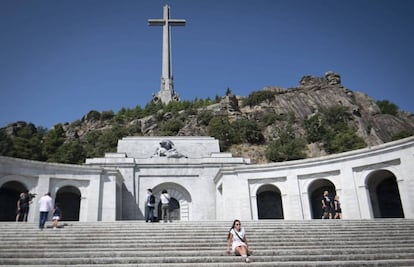Madrid set to order Franco’s reburial, but family vows to keep on fighting
Government due to order exhumation at Friday Cabinet meeting and give the dictator’s family 15 days to choose alternative resting place


The Spanish government plans to order the exhumation of the late dictator Francisco Franco at its regular weekly Cabinet meeting this Friday, and to give his family 15 days to designate a new burial site. They will not be able to opt for their first choice, La Almudena cathedral, which is located in downtown Madrid.
This is the latest move in a long and winding process that began when Prime Minister Pedro Sánchez came to power in early June after leading a successful no-confidence vote against the Popular Party (PP) government of Mariano Rajoy.
On Monday, the PP accused Pedro Sánchez, of the Socialist Party (PSOE), of being “obsessed with Franco.”
“Every time the government is in trouble, it looks to the past to try to pit Spaniards against one another,” said Marta González, the conservative party’s deputy secretary for communications.
This is a great opportunity to explain to thousands of Spaniards why a dictator’s tomb cannot be maintained with public funds
Association for the Recovery of Historical Memory
Sánchez made it a priority to move Franco’s remains from their current resting place at the Valley of the Fallen memorial outside Madrid, in order to turn the landmark site into a more neutral place to honor the victims of the 1936-1939 Civil War and subsequent dictatorship.
But his plan has met with fierce opposition from the Franco family. In October, relatives said that if they were obliged to take their grandfather out of the Valley of the Fallen, they would move him to the family vault inside La Almudena cathedral, in the heart of one of Madrid’s most popular areas for tourists.
And in January, the religious leader of the basilica at the Valley informed government officials that they would be denied authorization to access the mausoleum to take away the body.
But the executive, which is using a government decree to order the transfer, considers that neither the Franco family nor the Benedictine abbey at the Valley of the Fallen can oppose the move. The order will get the final go-ahead this coming Friday at the Cabinet meeting, according to Spanish online daily eldiario.es.
Family appeals
The Franco family did not express surprise at the government’s latest plans. Its legal representative, Luis Felipe Utrera-Molina, has already drafted an appeal against the government’s decision to exhume the body. But after the decree is published in the Official Gazette, there is a two-month window in which to file the challenge with the Supreme Court, and many things could happen within that period of time, including the possibility of a snap general election leading to a new government.
The executive wants the family to choose a different burial site that cannot be La Almudena because this would “pose evident risks to public order, citizen security and mobility,” according to a report from the Solicitor General’s office. Officials want to prevent the new grave from becoming a place “of exaltation” of the Franco regime. The report says that Franco’s is a “public grave” and that access to it cannot be denied.
The family, in the meantime, is preparing to file new appeals with the Supreme Court, which is considering the Francos’ request to legally stop the exhumation (see box).
In May 2017, the Spanish parliament approved a non-binding motion to transfer Franco’s remains from the Valley of the Fallen. And on September 13, 2018 Congress backed a decree to exhume the dictator’s remains and turn the Valley of the Fallen into a monument of collective memory and reconciliation.
The Association for the Recovery of Historical Memory (ARMH) has asked the government to make the transfer of Franco’s body an open and transparent process, in contrast with the 2005 removal of the last remaining Franco statue in Madrid, which was conducted before dawn to minimize public attention.
The ARMH says this is “a great opportunity” for the government to engage in an educational exercise on democracy and explain to thousands of Spaniards who did not study about the repression at school why a dictator’s tomb “cannot be maintained with public funds.”
English version by Susana Urra.
Tu suscripción se está usando en otro dispositivo
¿Quieres añadir otro usuario a tu suscripción?
Si continúas leyendo en este dispositivo, no se podrá leer en el otro.
FlechaTu suscripción se está usando en otro dispositivo y solo puedes acceder a EL PAÍS desde un dispositivo a la vez.
Si quieres compartir tu cuenta, cambia tu suscripción a la modalidad Premium, así podrás añadir otro usuario. Cada uno accederá con su propia cuenta de email, lo que os permitirá personalizar vuestra experiencia en EL PAÍS.
¿Tienes una suscripción de empresa? Accede aquí para contratar más cuentas.
En el caso de no saber quién está usando tu cuenta, te recomendamos cambiar tu contraseña aquí.
Si decides continuar compartiendo tu cuenta, este mensaje se mostrará en tu dispositivo y en el de la otra persona que está usando tu cuenta de forma indefinida, afectando a tu experiencia de lectura. Puedes consultar aquí los términos y condiciones de la suscripción digital.








































